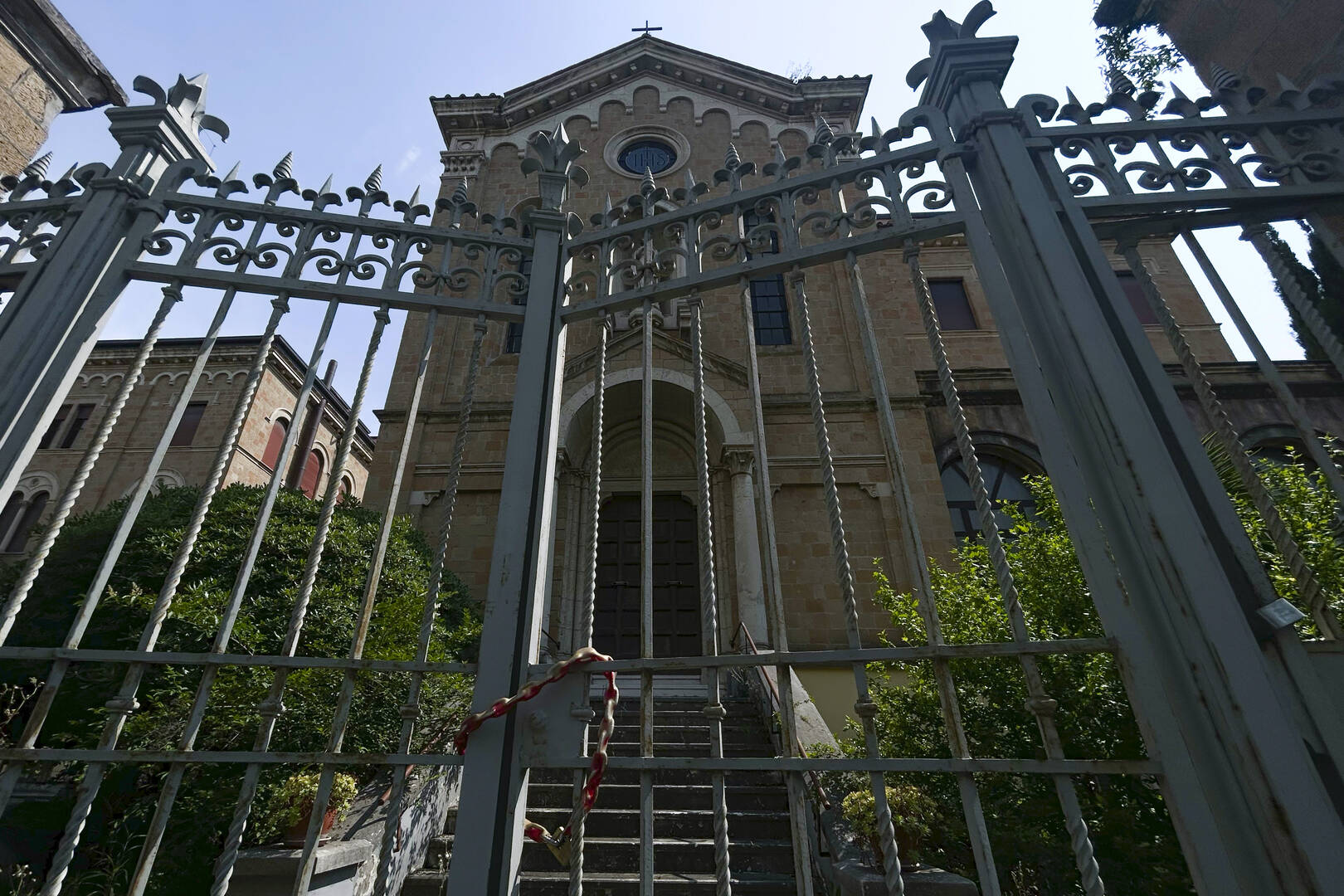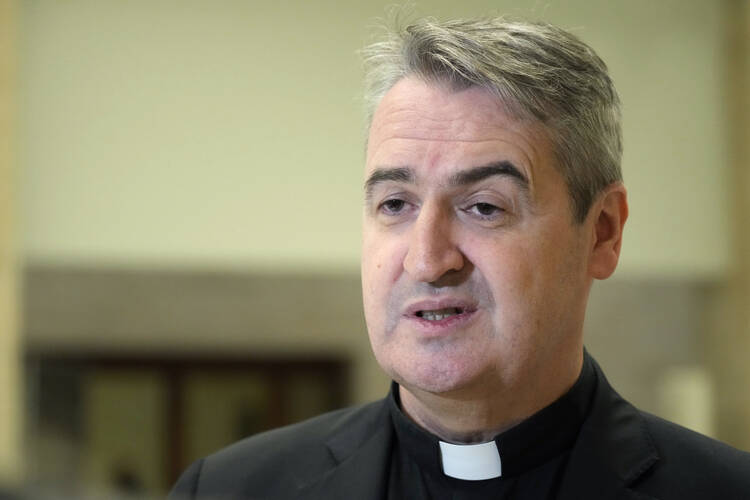VATICAN CITY (AP) — The former monastery on a quiet residential street in Rome once sheltered Jews fearing deportation in World War II. Purchased by the Vatican in 2021 as a dormitory for foreign nuns studying at Rome’s pontifical universities, the building now stands empty, a collateral victim of the latest financial scandal to hit the Holy See.
Pope Francis has asked aides to get to the bottom of how at least $17 million, including money to refurbish the dorm, was transferred from the Vatican’s U.S.-based missionary fundraising coffers into an impact investing vehicle run by a priest, The Associated Press has learned. Two years later, the U.S. fundraiser says the money is gone, and the monastery is shuttered. Its renovation is tied up in bureaucratic red tape, while the nuns studying in Rome are still housed at a convent a 90-minute commute away.
The story of what happened to the money is one that has vexed Vatican officials on both sides of the Atlantic, all the more because the transfers appear entirely legal. But they have nevertheless prompted the new leadership of the Vatican’s missionary fundraising operation in the U.S., The Pontifical Mission Societies, to replace the staff and board of directors who approved them, and overhaul its bylaws and statutes, to make sure nothing like this ever happens again.
And for now, the organization known as TPMS-US has written off $10.2 million of the total transferred as a loss since “there is no timeline and no guarantee of investment return,” according to its latest audited financial statement.
The money was transferred from TPMS-US into a New York-based non-profit and its private equity fund, both of which were created by the Rev. Andrew Small while he was the national director of TPMS-US.
The money was transferred from TPMS-US into a New York-based non-profit, Missio Corp., and its private equity fund, MISIF LLC, both of which were created by the Rev. Andrew Small while he was the national director of TPMS-US. Both financial vehicles aim to raise capital to provide low-interest loans and investments to church-run farming initiatives in Africa.
The bulk of the money was transferred in 2021, right before Small ended his 10-year tenure at TPMS-US. Small, a British-born Oblate of the Mary Immaculate priest, remains CEO of Missio Corp., while now serving on a temporary basis as the No. 2 at the Vatican’s child protection advisory board.
In a series of emailed responses to AP questions, Small strongly defended the money transfers as fully approved and in the best interest of the church and TPMS-US. He provided letters from grateful bishops and nuns in Africa who have benefited from Missio Corp.’s low-interest loans, as well as letters from two Vatican cardinals expressing interest in his impact investing initiatives.
But the transfers have, at least temporarily, reduced the endowment fund of TPMS-US by a quarter and seemingly diverted money raised in the pope’s name away from Vatican-approved charities and works in Africa, Asia and Latin America. The loss is thus the latest financial headache for the Holy See, which for decades has been beset by episodes of loss-making investments, opaque accounting methods, porous budgets and conflicts of interest that have undermined its financial reputation.
[Related: Is the Vatican misleading donors? Peter’s Pence, explained.]
“The Holy See is aware of the situation and is currently looking into the details of the events,” Vatican spokesman Matteo Bruni said in a statement to AP.
According to publicly available tax returns and financial statements, the moneys transferred included $7 million in expense “reimbursements,” undefined “contributions” and “support,” from TPMS-US to Missio Corp. from 2019-2021. The bulk of the transfers is a $10.2 million investment in MISIF LLC, $7.5 million of which came from a TPMS-US endowment fund.
That investment served as the sponsoring seed investment that persuaded the U.S. federal government’s International Development Finance Corp., in 2021 to loan MISIF LLC $20 million to provide microloans to church-run agribusinesses and educational programs.
Because the TPMS-US board approved the transfers, any litigation to get it back is implausible.

But according to officials at TPMS-US, it remains unclear if the board was fully informed about the transfers and the Vatican’s view of them, especially concerns expressed by the then-prefect of the Vatican’s missionary office, Cardinal Fernando Filoni.
The Rev. Robert Gahl, a moral theologian who runs a church administration and management program at the Catholic University of America, also said the evangelical thrust of TPMS-US donations — which mostly come via an annual Mass collection each October for the Vatican’s missionary activities — differs from MISIF’s more general development strategy of loans that must be repaid.
“How can donor intent be assured if the aims of the two are so different?” he asked. “Donor intent is defended in both civil and canon law,” he added.
Lloyd Mayer, a professor specializing in nonprofit law at Notre Dame Law School, said he didn’t see any “red flags” in the transfers, but “a few yellow flags.”
“And the legal question for me is: has someone violated a legal duty here, or is this essentially an internal political dispute?”
Small strongly defended the transfers as consistent with both the mission of TPMS-US and his fiduciary duty to increase its funding, which he said had been steadily declining as donations dried up. He said he also tried crowdsourcing, where donors could see the direct outcome of their gifts, to raise money.
He said donors were increasingly unwilling to just give to the Vatican via the typical structure, where Rome decides where donations are spent — a reference to donor distrust of the opaque finances of the Holy See in general and the Vatican’s missionary office in particular.
Rev. Small, former national director of The Pontifical Mission Societies: “The ultimate goal was to create a social impact fund that could provide low-interest loans to church-run enterprises in Africa.”
“A lot of it goes to bishops and nuncios with only a tiny fraction going to priests and sisters,” Small said. “Many millions of dollars of the US money help pay the expenses of operating nunciatures in mission countries, which seems anomalous with the messages sent to the faithful on Mission Sunday each year.”
Small said he developed Missio Corp., and its public-facing Missio Invest website, because he wanted to apply the principles of impact investing to the needs of the church in mission territory. It was an idea that had some support in the Vatican, which hosted three impact investing conferences in 2014, 2016 and 2018.
“The ultimate goal was to create a social impact fund that could provide low-interest loans to church-run enterprises in Africa so as to create a sustainable source income for the church and, presumably, make them less dependent on foreign annual donations which had shown themselves to be increasingly precarious,” Small said.
Small said the board of TPMS-US was informed of all developments and approved all the transfers, and that he made at least annual presentations to the Vatican’s missionary office.
Robert Warren, a retired IRS criminal investigator who now teaches accounting at Radford University in Virginia, said the relationship between TPMS-US and Missio Corp., on its surface is problematic because Small headed both. Such interlocking relationships, he said, require extra scrutiny by auditors and management.
“I always tell my students: You have to determine whether there is an arm’s length transaction. If you have related parties, that means by definition you do not have an arm’s length transaction,” he said. If one charity is providing the bulk of funding to keep a second charity going “you now have an interrelated party and all those transactions require extra scrutiny by the auditors and by management.”
TPMS-US asked for the $10.2 million investment in MISIF back, but Missio Corp., “denied the request,” according to the TPMS-US audited financial statement.
After Small’s term ended in 2021, TPMS-US under the leadership of its new national director, Monsignor Kieran Harrington, hired a law firm to investigate. Small didn’t respond to the lawyers’ questions.
“The independent analysis concluded that the TPMS board approved the funds transfers in a way consistent with their powers and the TPMS bylaws,” TPMS-US told AP in a statement.
Harrington subsequently replaced the board with more high-ranking officials and Vatican oversight. It includes the pope’s ambassador to the United States, Archbishop Christophe Pierre, along with other senior U.S. cardinals and archbishops, including Boston Cardinal Sean O’Malley, who as head of the Vatican’s child protection board, is now Small’s boss.
“The new board is working to evaluate the governance structures of TPMS and will soon recommend new ecclesiastical statutes and vote upon the civil corporation bylaws,” TPMS-US told AP.
TPMS-US asked for the $10.2 million investment in MISIF back, but Missio Corp., “denied the request,” according to the TPMS-US audited financial statement.
“Management of the organization is diligently working to redeem the investment, however there is no timeline and no guarantee of investment return,” the statement says. TPMS-US now values the $10.2 million investment as a total loss.
Small criticized the write-off as “shortsighted,” saying there were no grounds for such a decision based on the fund’s performance. Small said the board knew well the minimum 10-year commitment of the investment, and that regardless the MISIF investing model considers the economic impact on local communities as part of the return for investors.
He said it was “unfortunate” that TPMS-US had such little confidence in the mission church’s ability to repay its loans.
When the Vatican in 2021 asked TPMS-US for more money to renovate a Rome building for sisters, the education fund for religious sisters was empty.
“If we don’t believe in our missionary colleagues, how will banks and other capital markets?” he asked.
However, even Small’s own auditors said they were unable to verify his fund’s calculation of the fair value of its investment portfolio as of December 2021 and declined to express an opinion on its financial statements for that year.
The fate of the Rome residence for nuns is now tied up in Italian bureaucracy and pandemic-related construction delays. The Vatican had purchased the building after TPMS-US sent $13 million from a fund it had established to support the education of religious sisters.
The building has a rich history: During WWII, when it was owned by a Canadian order of nuns, it housed at least 80 Jews who were hiding from Rome’s Nazi occupiers, according to archival research published in the Vatican newspaper L’Osservatore Romano.
When the Vatican in 2021 asked TPMS-US for more money to renovate the building, the education fund for religious sisters was empty. Small said the board, “for a variety of reasons,” had decided not to send the remaining $4.7 million to Rome but instead to his Missio Corp., to fund the training of sisters in Africa, which he said was consistent with its intended purpose.
The Vatican is believed to have found other funding, but the Rome residence today stands empty, a chain lock around its front gate. The nuns studying at the Pontifical Urbaniana University live at a campus in Castel Gandolfo, a 90-minute commute away.
“They lose so much time traveling,” said Sister Genowefa Kudlik, the Polish nun who runs the Castel Gandolfo campus. “The property was bought some years back, I believe. But I don’t think anything was done.”








